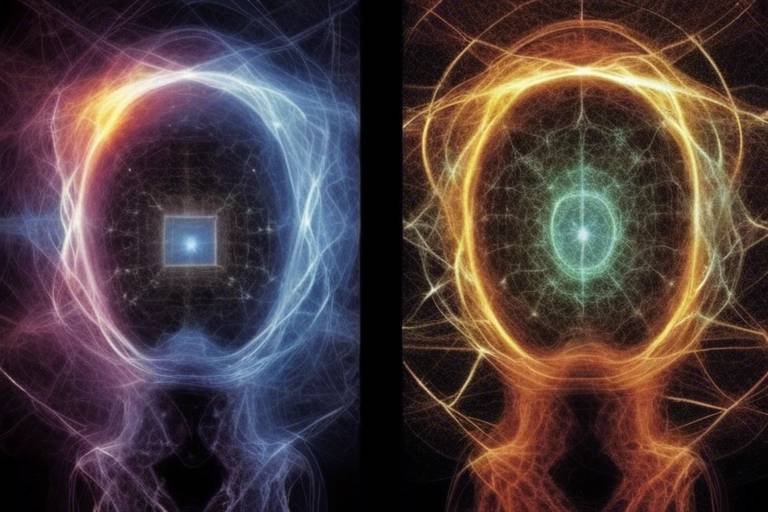What Can Ontology Tell Us About Reality?
Have you ever pondered the question of what it means to exist? Or considered the essence of reality itself? If so, you're not alone! Ontology, a branch of philosophy, dives deep into these intriguing questions. It seeks to unravel the mysteries of being, existence, and the very fabric of reality. In this article, we will explore the multifaceted nature of ontology and its implications for our understanding of the world around us.
At its core, ontology grapples with fundamental concepts such as existence, the categories of being, and the relationship between entities and their properties. Think of ontology as the lens through which we examine the universe—much like a magnifying glass that allows us to see the intricate details of existence. It prompts us to ask questions like: What truly exists? How do we categorize different forms of being? And what does it mean for something to have essence?
Throughout history, ontology has been shaped by the thoughts and writings of numerous philosophers. From the ancient musings of Aristotle to the modern existentialists, each thinker has contributed to our understanding of reality in their unique way. Aristotle, for instance, introduced the idea of categorizing beings, which laid the groundwork for future ontological discussions. His work prompts us to consider not just what exists, but how we classify and understand these entities within the broader scope of reality.
In contemporary times, the relevance of ontology has not diminished. Instead, it has evolved, intertwining with various fields such as science, ethics, and even everyday life. The implications of ontological beliefs can be profound, influencing how we perceive our surroundings, make decisions, and interact with others. For instance, consider how our understanding of existence shapes our values and actions. If we believe in a shared reality, we may be more inclined to cooperate and empathize with one another.
As we delve deeper into this exploration of ontology, we will uncover how it informs our understanding of both the physical and abstract realms. From the intricate dance of particles in quantum mechanics to the complexities of biological classifications, ontology provides a framework for interpreting the nature of existence. So, buckle up! This journey into the heart of reality promises to be as enlightening as it is thought-provoking.
- What is ontology? Ontology is the philosophical study of being, existence, and the nature of reality.
- Why is ontology important? It helps us understand the fundamental categories of existence and informs various fields, including science, ethics, and daily life.
- How has ontology evolved over time? From Aristotle's classifications to modern existentialist interpretations, ontology has been shaped by numerous philosophers and continues to be relevant today.
- What role does ontology play in science? Ontology influences scientific perspectives, particularly in fields like physics and biology, where questions of existence and classification are paramount.

The Foundations of Ontology
Ontology, at its core, is the philosophical study of being and existence. It dives deep into questions like "What does it mean to exist?" and "What kinds of things exist?" These foundational concepts are not just abstract ideas; they shape our understanding of reality itself. Imagine ontology as the blueprint of our universe, where every entity and its properties are meticulously categorized and analyzed. By exploring the nature of being, ontology provides a framework that helps us navigate the complexities of existence.
One of the fundamental aspects of ontology is the distinction between entities and their properties. Entities refer to the things that exist, such as objects, people, and even ideas. Properties, on the other hand, are the attributes or characteristics that define these entities. For instance, consider a tree. The tree itself is an entity, while its height, color, and type of leaves are its properties. This distinction is crucial because it allows us to understand not just what exists, but also how those existences relate to one another.
Another important concept in ontology is the categorization of being. Philosophers have long sought to classify entities into various categories to make sense of the world around us. For example, some entities are physical, while others are abstract. Some exist independently, while others are dependent on other entities for their existence. This categorization can be visualized in a simple table:
| Category | Description | Examples |
|---|---|---|
| Physical Entities | Things that occupy space and have mass. | Rocks, trees, animals |
| Abstract Entities | Concepts that do not have a physical presence. | Numbers, ideas, emotions |
| Dependent Entities | Entities that require other entities for their existence. | Social constructs, relationships |
| Independent Entities | Entities that exist on their own. | Planets, stars, individual organisms |
This categorization not only helps in understanding the nature of being but also aids in various fields such as science, metaphysics, and even everyday decision-making. By knowing what kind of entities we are dealing with, we can better understand their interactions and implications in our lives.
In essence, the foundations of ontology are built upon these core concepts of existence, categories of being, and the intricate relationship between entities and their properties. This philosophical inquiry is not merely an academic exercise; it has profound implications for how we perceive and interact with the world around us. Understanding ontology equips us with the tools to question our assumptions about reality and encourages us to explore the depths of existence itself.
- What is ontology? Ontology is the philosophical study of being and existence, focusing on what entities exist and how they can be categorized.
- Why is ontology important? Ontology helps us understand the nature of reality, influences various fields of study, and shapes our perceptions and interactions in everyday life.
- How does ontology relate to other philosophical disciplines? Ontology is closely related to metaphysics, epistemology, and ethics, as it lays the groundwork for understanding existence, knowledge, and moral values.

Historical Perspectives on Ontology
Throughout the annals of philosophy, ontology has been a pivotal area of inquiry, shaping our understanding of existence and reality. The journey of ontological thought is rich and complex, populated by influential thinkers who have left indelible marks on this field. From the ancient musings of Aristotle to the modern debates among existentialists, ontology has evolved, reflecting the changing tides of human thought. It's fascinating to consider how these historical perspectives not only inform our current understanding but also challenge us to think deeper about the nature of being.
One of the most significant figures in the history of ontology is Aristotle, who laid the groundwork for many ontological discussions. His categorization of beings into distinct groups provided a framework that philosophers would build upon for centuries. Aristotle's ontology emphasized the importance of substance—the essence of what something is—and how it relates to the properties that define it. This classification was not merely academic; it was a way to understand the world around us, influencing not just philosophy but also science and theology.
As we move through history, we encounter the Medieval philosophers, who took Aristotle's ideas and integrated them with theological perspectives. Thinkers like Thomas Aquinas expanded on the concept of being, intertwining it with notions of God and existence. This period saw ontology becoming a bridge between faith and reason, as scholars sought to reconcile ancient philosophy with religious doctrine. The discourse during this time laid the foundation for future debates about the nature of existence, prompting questions such as: What does it mean for something to exist? Is existence a property of beings, or is it something more profound?
Fast forward to the Modern Era, where ontology took on new dimensions. Philosophers like Immanuel Kant challenged traditional views, arguing that our understanding of reality is shaped by our perceptions and cognitive structures. Kant's work introduced the idea that the nature of being is not just an external reality but is also influenced by human experience. This shift opened the door to various ontological theories, including realism, which asserts that objects exist independently of our perception, and nominalism, which questions the existence of universal entities.
In contemporary discussions, existentialists such as Martin Heidegger and Jean-Paul Sartre have further revolutionized ontological thought by focusing on individual existence and the meaning of being in a seemingly indifferent universe. Their works challenge us to confront the absurdity of existence and the freedom that comes with it, urging us to reflect on our place in the world. This evolution of thought illustrates how ontology is not a static discipline but rather a dynamic conversation that adapts and grows with each philosophical inquiry.
To summarize, the historical perspectives on ontology reveal a rich tapestry of thought that spans centuries. From Aristotle's foundational categories to the existential musings of modern philosophers, each era has contributed to a deeper understanding of what it means to exist. This ongoing dialogue not only enriches our philosophical landscape but also invites us to engage with the fundamental questions of life, existence, and reality.
- What is ontology? Ontology is the branch of philosophy that studies the nature of being, existence, and the categories of being.
- Who is the father of ontology? Aristotle is often regarded as the father of ontology due to his foundational work in categorizing beings and substances.
- How does ontology relate to modern philosophy? Ontology continues to influence modern philosophy, particularly in discussions about existence, reality, and the nature of knowledge.
- What are some key concepts in ontology? Key concepts include substance, essence, existence, and categories of being.

Aristotle and the Categories
When we think about the foundations of ontology, we can't overlook the monumental influence of Aristotle. His work in the realm of categorization laid the groundwork for how we understand existence itself. In his seminal text, the "Categories," Aristotle introduces a framework that classifies entities into distinct groups, providing a lens through which we can analyze the complexities of being. Imagine trying to navigate a vast library without a catalog; Aristotle's categories serve as that essential guide, helping us make sense of the myriad forms of existence.
Aristotle identifies ten primary categories that help us articulate different aspects of being. These categories range from the concrete to the abstract, allowing us to grasp the nature of things in a structured way. To illustrate, here’s a breakdown of these categories:
| Category | Description |
|---|---|
| Substance | The fundamental reality that exists independently. |
| Quantity | The measurable aspects of a substance, like length or volume. |
| Quality | The characteristics that define a substance, such as color or texture. |
| Relation | The way substances relate to one another. |
| Place | The location of a substance in space. |
| Time | The temporal context in which a substance exists. |
| Position | The physical state of a substance, like sitting or standing. |
| State | The condition of a substance, such as being clothed or armed. |
| Action | The activities a substance performs. |
| Passion | The experiences a substance undergoes. |
These categories are not just arbitrary labels; they are fundamental to understanding the essence of what it means to exist. For Aristotle, substance is the most crucial category, as it refers to what things are in their most basic form. Everything else—quantity, quality, relation—depends on this primary concept of substance. Think of it like the canvas of a painting: without the canvas, there can be no artwork. Similarly, without substance, the other categories lose their meaning.
Moreover, Aristotle's influence extends beyond mere categorization. His work invites us to ponder deeper ontological questions: What does it mean for something to exist? How do we differentiate between the essence of an object and its accidental properties? These questions are not just academic; they resonate in our everyday lives as we navigate our perceptions and interactions with the world around us.
In conclusion, Aristotle's categories provide a crucial framework for understanding the nature of reality. They challenge us to consider not just what exists, but how we can categorize and interpret that existence in meaningful ways. As we move forward in our exploration of ontology, Aristotle's insights remain as relevant today as they were over two millennia ago.
- What is ontology? Ontology is the branch of philosophy that studies the nature of being, existence, and reality.
- Why are Aristotle's categories important? They provide a foundational framework for understanding different aspects of existence and help clarify our perceptions of reality.
- How do Aristotle's ideas influence modern philosophy? His categorization of beings continues to shape discussions in metaphysics, epistemology, and even science.
- Can ontology be applied to everyday life? Yes, our ontological beliefs influence our perceptions, decisions, and interactions in daily life.

Substance and Essence
When we dive into the philosophical waters of substance and essence, we are essentially trying to grasp the very fabric of reality itself. Aristotle, a towering figure in the realm of ontology, posited that substance is what underlies everything — think of it as the building blocks of existence. In his view, substances are individual entities, like a specific tree or a particular cat, that have a distinct identity. But what makes these substances what they are? This is where essence comes into play.
Essence refers to the fundamental qualities that make an entity what it is. For example, consider a cat. Its essence might include characteristics such as being a mammal, having fur, and being capable of meowing. These traits aren’t just arbitrary; they define the very nature of what it means to be a cat. Without these essential qualities, we might end up with something that looks like a cat but lacks its true identity. So, in essence, we can think of substance as the 'what' of an entity, while essence represents the 'why' — the intrinsic qualities that give it meaning.
To further illustrate this relationship, let’s consider a simple table that outlines the differences between substance and essence:
| Aspect | Substance | Essence |
|---|---|---|
| Definition | The individual entity that exists | The intrinsic qualities that define the entity |
| Example | A specific dog named Max | Being a dog, having four legs, barking |
| Philosophical Importance | Identifies what exists | Explains what it means for something to exist |
This distinction is crucial in ontology because it helps us navigate the complex landscape of existence. By understanding the interplay between substance and essence, we can better appreciate how entities relate to one another and how they fit into the broader tapestry of reality. For instance, if you were to encounter a new species of animal, recognizing its substance would allow you to classify it, while understanding its essence would reveal its role in the ecosystem and its relationship to other forms of life.
In summary, the concepts of substance and essence are foundational to our understanding of ontology. They invite us to ask profound questions: What does it mean to exist? How do we define the core characteristics that make something what it is? These inquiries not only enrich our philosophical discussions but also enhance our everyday experiences as we encounter the myriad forms of existence around us.
- What is the difference between substance and essence?
Substance refers to the individual entity that exists, while essence encompasses the intrinsic qualities that define that entity.
- Why are substance and essence important in philosophy?
They help us understand the nature of existence and the relationships between different entities.
- Can something exist without essence?
In philosophical terms, an entity may exist as a substance, but without essence, it would lack identity and meaning.

Ontology in Medieval Philosophy
The exploration of ontology during the Medieval period is a fascinating journey through the intertwining of philosophy and theology. Think of it as a grand tapestry where threads of ancient Greek thought, particularly that of Aristotle, are woven with the rich fabric of Christian doctrine. Medieval philosophers took Aristotle's foundational ideas and expanded upon them, seeking to reconcile reason and faith in their quest to understand existence. This led to a vibrant discourse that shaped the very essence of ontological inquiry.
One of the pivotal figures in this period was Thomas Aquinas, who synthesized Aristotelian philosophy with Christian theology. Aquinas introduced the concept of the “Great Chain of Being,” a hierarchical structure that places all entities in a continuum from the most basic forms of existence to the divine. This hierarchy not only illustrated the relationships between different beings but also emphasized the importance of each entity's essence and existence. For Aquinas, understanding ontology was essential for grasping God's nature and His relationship to creation.
Moreover, the Medieval philosophers debated the nature of universals—whether they exist independently of the objects they describe or are merely names we use to categorize our experiences. This debate can be summed up in two primary positions:
- Realism: The belief that universals exist independently of particular things.
- Nominalism: The view that universals are merely names or labels we use for groups of objects.
This tension between realism and nominalism had profound implications for ontology, influencing how scholars approached the existence of abstract concepts such as justice, beauty, and truth. The discussions surrounding these ideas often reflected the broader theological debates of the time, as philosophers sought to understand how these abstractions related to the divine.
In addition to Aquinas, other notable thinkers like John Duns Scotus and William of Ockham contributed significantly to the ontological landscape of the Medieval period. Duns Scotus emphasized the importance of individual entities and their unique properties, while Ockham is famous for his principle of Occam's Razor, which advocates for simplicity in explanations—suggesting that one should not multiply entities beyond necessity. This principle had lasting effects on ontological discussions, encouraging philosophers to seek the simplest explanations for existence.
Ultimately, the Medieval period laid a crucial foundation for modern ontological thought. The integration of Aristotelian categories with theological considerations created a rich intellectual environment that challenged thinkers to ponder deep questions about existence, essence, and the nature of reality. The ideas developed during this time not only influenced subsequent philosophical inquiries but also continue to resonate in contemporary discussions about the nature of being.
What is ontology?
Ontology is the branch of philosophy that studies the nature of being, existence, and the categories of being. It seeks to understand what entities exist and how they can be grouped and related within a hierarchy.
How did Medieval philosophers contribute to ontology?
Medieval philosophers like Thomas Aquinas, John Duns Scotus, and William of Ockham expanded upon Aristotelian ideas, integrating them with theological concepts. They explored the nature of universals, the existence of individual entities, and the relationship between God and creation.
What is the significance of the Great Chain of Being?
The Great Chain of Being is a hierarchical structure that illustrates the relationships between different forms of existence, from inanimate objects to the divine. It emphasizes the interconnectedness of all entities and their place in the cosmos.
What is Occam's Razor?
Occam's Razor is a philosophical principle that suggests one should not make more assumptions than necessary when explaining something. It encourages simplicity in explanations, which has implications for ontological discussions about existence.

Modern Ontological Theories
In the ever-evolving landscape of philosophy, have emerged as a fascinating tapestry of ideas that challenge and expand our understanding of reality. Unlike the classical approaches that often focused on rigid categories of being, contemporary ontology embraces a more fluid and dynamic perspective. This shift has been fueled by various philosophical movements, each offering unique insights into the nature of existence.
One prominent movement is realism, which posits that entities exist independently of our perceptions or beliefs. Realists argue that the world is composed of a multitude of objects and structures that remain constant, regardless of our understanding or interpretation. This perspective emphasizes the importance of objective reality, suggesting that our knowledge is a reflection of an external world that exists outside of our minds.
In contrast, nominalism challenges the notion of universal truths and categories. Nominalists assert that general terms and classifications are merely names we assign to groups of objects, lacking any intrinsic existence of their own. For instance, the concept of "redness" does not exist outside of red objects; rather, it is a label we use to describe a shared quality. This perspective invites us to reconsider how we categorize and understand the world around us, highlighting the subjective nature of our classifications.
Then we have idealism, which takes an even more radical approach by suggesting that reality is fundamentally mental or spiritual. Idealists argue that what we perceive as the physical world is actually a manifestation of consciousness. This leads to profound questions about the nature of existence: Is what we see merely an illusion? Are our thoughts the primary reality, shaping the world around us? Such inquiries push the boundaries of traditional ontology, inviting us to explore the relationship between mind and matter.
To better understand these theories, let’s summarize their core ideas in the table below:
| Ontology Theory | Key Idea |
|---|---|
| Realism | Entities exist independently of our perceptions. |
| Nominalism | General terms and classifications are merely names. |
| Idealism | Reality is fundamentally mental or spiritual. |
As we navigate these modern ontological theories, it becomes evident that each perspective offers distinct implications for our understanding of reality. They compel us to question the very nature of existence and our role in shaping it. For example, if we adopt a realist viewpoint, we might prioritize scientific inquiry and objective observation. Conversely, a nominalist approach could lead us to focus on the fluidity of language and the subjective nature of our experiences. Meanwhile, idealism may encourage us to explore the depths of consciousness and the interconnectedness of all beings.
In conclusion, the ongoing discourse surrounding modern ontological theories not only enriches philosophical inquiry but also invites us to reflect on our own beliefs about reality. As we grapple with these ideas, we find ourselves at the intersection of thought and existence, where the quest for understanding continues to unfold.
- What is ontology?
Ontology is the branch of philosophy that studies the nature of being, existence, and the categories of being. - How do modern ontological theories differ from classical theories?
Modern theories often emphasize fluidity and subjectivity, while classical theories tend to focus on fixed categories and objective existence. - What are some examples of modern ontological theories?
Examples include realism, nominalism, and idealism, each offering unique perspectives on existence. - Why is ontology important in philosophy?
Ontology helps us understand the fundamental nature of reality, which is crucial for other areas of philosophy, science, and everyday life.

Ontology and Science
When we think about the relationship between ontology and science, it’s like trying to solve a puzzle with pieces that sometimes fit and sometimes don’t. At its core, ontology seeks to understand what exists and the nature of those existences, while science is all about exploring and explaining the universe through empirical evidence. But how do these two realms interact? Well, let's dive in!
First off, ontology is crucial in framing the questions that science seeks to answer. For instance, when scientists study the universe, they often have to clarify what they mean by concepts like "matter" or "energy." These terms are not just scientific jargon; they are ontological categories that help us make sense of reality. So, when a physicist talks about "particles," they are not just discussing physical entities; they are engaging in a deeper ontological inquiry about the nature of existence itself.
Moreover, scientific discoveries can radically shift our ontological perspectives. Take the realm of quantum mechanics, for example. Traditional ontological views often consider objects to have definite properties. However, as quantum theory suggests, particles can exist in a state of superposition, meaning they can be in multiple states at once until observed. This challenges our very notion of what it means for something to "exist." It’s like saying that a coin can be both heads and tails until you flip it! This profound implication forces us to rethink our categories of being and existence.
Additionally, the field of biological ontology introduces another layer of complexity. In biology, we often categorize living organisms based on shared characteristics. But what does it mean to classify something as a "species"? Is it merely a biological distinction, or does it carry deeper ontological implications about the essence of life? The debate over species classification, including concepts like species realism versus nominalism, showcases how ontology shapes our understanding of life itself. It’s a bit like trying to define a family; are we talking about genetic ties, cultural connections, or something more abstract?
To summarize, the interplay between ontology and science is not just a theoretical exercise; it has real-world implications. As our scientific understanding evolves, so too must our ontological frameworks. This ongoing dialogue is essential for both philosophers and scientists as they navigate the complexities of existence.
- What is ontology? - Ontology is a branch of philosophy that studies the nature of being, existence, and the categories of being.
- How does ontology relate to science? - Ontology helps frame the questions that science seeks to answer, while scientific discoveries can reshape our ontological perspectives.
- What is quantum ontology? - Quantum ontology explores the implications of quantum mechanics on our understanding of reality, including concepts like superposition and entanglement.
- Why is biological ontology important? - Biological ontology examines how we classify living organisms and the implications of those classifications for our understanding of life.

Quantum Ontology
Quantum ontology is a fascinating and somewhat perplexing area of study that dives deep into the very fabric of reality as we understand it. At its core, it challenges our traditional notions of existence, prompting us to reconsider what it means for something to be "real." In the quantum realm, particles behave in ways that defy our everyday experiences. Have you ever thought about how a single particle can exist in multiple states at once? This phenomenon, known as superposition, raises profound questions about the nature of reality itself.
To illustrate this, consider the famous thought experiment known as Schrödinger's Cat. Imagine a cat in a sealed box with a radioactive atom that has a 50% chance of decaying within an hour. If the atom decays, it triggers a mechanism that kills the cat; if it doesn't, the cat remains alive. Until we open the box and observe the cat, it exists in a superposition of both "alive" and "dead." This paradox highlights the role of the observer in determining the state of a quantum system, suggesting that reality may not be as concrete as we once believed.
Quantum entanglement further complicates our understanding. When two particles become entangled, the state of one particle is directly related to the state of the other, regardless of the distance separating them. This phenomenon seems to imply that information can be transmitted instantaneously, defying the classical limitations of space and time. It raises the question: if particles can influence each other across vast distances, what does that say about the interconnectedness of all things in the universe?
In grappling with these concepts, scientists and philosophers alike are forced to confront some critical questions:
- What is the nature of reality when particles can exist in multiple states?
- How does observation affect the outcome of quantum events?
- Is our understanding of existence limited by our classical interpretations of the universe?
Moreover, quantum mechanics doesn't just stay in the realm of theoretical physics; it has practical implications in technology and philosophy. For instance, quantum computing harnesses the principles of superposition and entanglement to process information in ways that classical computers cannot. This leap forward could revolutionize industries, from cryptography to artificial intelligence, but it also forces us to reconsider our ontological frameworks. If the very building blocks of reality can behave unpredictably, how do we define existence in a world where certainty is elusive?
As we continue to explore quantum ontology, we find ourselves at the intersection of science and philosophy, where questions about reality become more intricate and layered. Understanding these phenomena not only enriches our knowledge of the universe but also challenges our perceptions and beliefs about existence itself.
- What is quantum ontology? Quantum ontology studies the implications of quantum mechanics on our understanding of reality and existence.
- How does superposition work? Superposition refers to a quantum system's ability to exist in multiple states simultaneously until it is observed.
- What is Schrödinger's Cat? It is a thought experiment that illustrates the concept of superposition in quantum mechanics.
- What is quantum entanglement? It is a phenomenon where two particles become interconnected, such that the state of one instantly influences the state of the other, regardless of distance.

Biological Ontology
When we dive into the fascinating world of biological ontology, we find ourselves grappling with the very essence of what it means to be alive. is not just about categorizing living organisms; it’s a profound inquiry into the nature of life itself. Think about it—what truly defines a living being? Is it the ability to reproduce, grow, or respond to stimuli? Or is it something deeper, perhaps an intrinsic quality that sets living entities apart from inanimate objects? This question leads us to explore how different classifications of life influence our understanding of existence.
At its core, biological ontology seeks to provide a framework for understanding the myriad forms of life that inhabit our planet. It categorizes organisms based on various criteria, including genetic makeup, evolutionary history, and ecological roles. For instance, consider the following categories:
- Taxonomic Classification: This includes the hierarchical system of categorizing organisms, from domains down to species.
- Functional Classification: Organisms can also be classified based on their roles in ecosystems, such as producers, consumers, and decomposers.
- Genetic Classification: Advances in genetics allow us to classify organisms based on their DNA and evolutionary relationships.
Each of these classifications provides a unique lens through which we can view the complexity of life. For example, taxonomic classification helps us understand the diversity of species, while functional classification sheds light on the interdependence of organisms within ecosystems. This interconnectedness is crucial for grasping the delicate balance of nature.
Moreover, biological ontology raises intriguing questions about the boundaries of life. Are viruses considered living entities? They exhibit some characteristics of life, such as reproduction and evolution, but they lack cellular structure and cannot reproduce independently. This ambiguity challenges our traditional definitions and pushes us to rethink our ontological categories.
In contemporary discussions, biological ontology also intersects with ethical considerations, particularly in fields like biotechnology and conservation. As we manipulate genetic material and create synthetic life forms, we must ask ourselves: what does it mean to create life? And how should we treat these entities? These questions are not merely academic; they have real-world implications for our environment and society.
To illustrate the relevance of biological ontology, consider this table summarizing key aspects:
| Category | Description | Example |
|---|---|---|
| Taxonomic Classification | Hierarchical system for categorizing organisms | Kingdom, Phylum, Class, Order, Family, Genus, Species |
| Functional Classification | Roles of organisms in ecosystems | Producers (plants), Consumers (animals), Decomposers (fungi) |
| Genetic Classification | Classification based on genetic makeup | Phylogenetic trees showing evolutionary relationships |
In conclusion, biological ontology is a rich and dynamic field that challenges us to rethink our understanding of life. As we continue to explore the complexities of living organisms, we must remain open to new ideas and perspectives. After all, the essence of life is not just a scientific question; it’s a philosophical one that invites us to ponder our place in the universe.
Q: What is biological ontology?
A: Biological ontology is the study of the nature of life and the classification of living organisms based on various criteria, including genetic, functional, and taxonomic aspects.
Q: Why is biological ontology important?
A: It helps us understand the complexity of life, the interdependence of organisms, and the ethical implications of manipulating life forms in biotechnology and conservation.
Q: Are viruses considered living organisms?
A: This is a debated topic. While viruses exhibit some characteristics of life, they lack cellular structure and cannot reproduce independently, leading to varying opinions on their classification.

Implications of Ontology in Everyday Life
When you think about ontology, you might picture philosophers in stuffy rooms debating the nature of existence, but the truth is, ontology has a profound impact on our everyday lives. It shapes how we perceive the world, interact with others, and even make decisions. At its core, ontology asks us to consider what it means for something to 'be.' This question isn't just academic; it influences everything from our personal beliefs to societal norms.
For instance, consider how our understanding of identity is deeply rooted in ontological concepts. When we define ourselves—whether as a parent, a professional, or a friend—we're engaging in an ontological exercise. We categorize ourselves and others based on shared characteristics and roles, which can affect our relationships and interactions. This categorization can lead to a sense of belonging or, conversely, feelings of alienation.
Moreover, ontology plays a crucial role in our decision-making processes. When faced with choices, we often weigh the existence and properties of the options available to us. Are we making decisions based on what truly exists, or are we influenced by perceptions and assumptions? Our beliefs about what is real can significantly shape our actions. For example, if we believe that success is tied to material wealth, we may prioritize career advancement over personal fulfillment. This belief system, rooted in ontological assumptions, can lead to a life that feels unbalanced or untrue to ourselves.
In terms of societal implications, ontology also informs our collective understanding of reality. The categories we create—such as race, gender, and class—are not just labels; they reflect deeper ontological beliefs about what constitutes human identity. These beliefs can shape policies, social interactions, and even cultural narratives. For instance, if a society predominantly views individuals through a lens of fixed categories, it may struggle with inclusivity and understanding the complexities of human experience.
To illustrate this further, consider the following table that outlines how different ontological perspectives can influence various aspects of life:
| Ontological Perspective | Implications |
|---|---|
| Realism | Belief in an objective reality; encourages evidence-based decision-making. |
| Nominalism | Focus on individual instances; promotes flexibility in categorization. |
| Idealism | Reality is mentally constructed; emphasizes the power of perception and thought. |
Ultimately, ontology isn't just an abstract philosophical concept; it's a lens through which we view our world. By understanding the implications of ontology in our daily lives, we can become more aware of the beliefs that guide our thoughts and actions. This awareness can lead to more intentional choices, deeper connections with others, and a richer understanding of ourselves and the world around us.
- What is ontology? Ontology is the branch of philosophy that studies the nature of being, existence, and reality.
- How does ontology affect my daily life? Ontological beliefs shape your perceptions, decisions, and interactions, influencing how you relate to yourself and others.
- Can ontology help improve my relationships? Yes! By understanding the categories and beliefs that influence your interactions, you can foster deeper connections and greater empathy.
- Why is ontology important in society? Ontological beliefs inform societal norms and policies, impacting how we categorize and understand different identities and experiences.

Conclusion: The Ongoing Relevance of Ontology
As we journey through the intricate landscape of philosophy, ontology emerges not just as a relic of intellectual history but as a vibrant, ongoing conversation that shapes our understanding of reality. In a world where our perceptions are constantly challenged by new discoveries and ideas, ontology offers a framework through which we can explore the fundamental questions of existence. It invites us to ponder: What does it truly mean to be? How do we categorize and understand the myriad forms of existence around us?
In today's age of rapid technological advancement and scientific discovery, the implications of ontology are more relevant than ever. For instance, the rise of artificial intelligence forces us to reconsider what it means to be "alive" or "conscious." Are these constructs merely human experiences, or do they extend to non-human entities? Similarly, our understanding of the universe has been profoundly altered by quantum mechanics, which challenges the very notions of reality and existence that ontology seeks to define.
Moreover, ontology influences various fields beyond philosophy, including science, art, and ethics. For example, in the realm of biology, the classification of living organisms requires a robust ontological framework to determine how we define life itself. In art, ontological questions arise when we consider the essence of creativity and the nature of artistic expression. In ethics, understanding the nature of existence can profoundly impact our moral frameworks and decisions.
Ultimately, ontology serves as a bridge connecting various disciplines, encouraging interdisciplinary dialogue that enriches our collective understanding of existence. It's not just about theoretical musings; it's about applying these ideas to our everyday lives. Ontological beliefs shape our perceptions, influence our decisions, and guide our interactions with others. As we navigate the complexities of modern life, engaging with ontological questions can provide clarity and insight into our experiences.
In conclusion, the ongoing relevance of ontology reminds us that the quest for understanding reality is a dynamic and evolving process. It challenges us to remain curious, to question our assumptions, and to embrace the complexities of existence. As we continue to explore these profound questions, we find that ontology is not merely a philosophical endeavor but a crucial part of our journey as conscious beings in an ever-changing world.
- What is ontology? Ontology is the branch of philosophy that studies the nature of being, existence, and reality.
- Why is ontology important? It helps us understand the fundamental categories of existence and informs various disciplines, including science, art, and ethics.
- How does ontology relate to modern science? Ontological questions arise in science, particularly in fields like quantum mechanics and biology, influencing how we understand existence and reality.
- Can ontology impact everyday life? Yes, ontological beliefs shape our perceptions, decisions, and interactions with others, making it relevant in our daily experiences.
Frequently Asked Questions
-
What is ontology?
Ontology is a branch of philosophy that explores the nature of being, existence, and reality. It delves into questions about what entities exist, how they can be categorized, and the relationships between them. Think of it as the study of what makes something "real" and how we understand that reality.
-
How did Aristotle contribute to ontology?
Aristotle laid the groundwork for ontology by introducing the concept of categories, which classify different types of beings. His work on substance and essence helped shape our understanding of existence, making it easier to differentiate between what something is and its properties. Essentially, he provided a framework that we still reference in philosophical discussions today.
-
What are modern ontological theories?
Modern ontological theories include realism, nominalism, and idealism. Realism posits that entities exist independently of our perceptions, while nominalism argues that universals are merely names without real existence. Idealism suggests that reality is mentally constructed. Each of these theories offers a unique perspective on how we understand existence and reality.
-
How does ontology relate to science?
Ontology and science are intertwined, as scientific discoveries can influence our ontological perspectives. For example, quantum mechanics introduces complex questions about the nature of reality, challenging traditional notions of existence with concepts like superposition and entanglement. This relationship highlights how science can reshape our understanding of what it means to exist.
-
What is quantum ontology?
Quantum ontology refers to the ontological implications of quantum mechanics. It raises questions about the nature of reality at the quantum level, such as whether particles exist in a definite state or if they are merely probabilities until observed. This challenges our conventional understanding of existence and pushes the boundaries of ontology.
-
How does ontology impact our daily lives?
Ontology isn't just a theoretical concept; it influences our everyday perceptions and decisions. Our beliefs about existence can shape how we interact with others, make choices, and understand our place in the world. For instance, if you believe in a particular essence of life, it may affect your values and priorities in life.
-
Why is ontology relevant today?
Ontology remains a vital area of inquiry because it addresses fundamental questions about existence and reality that are still relevant in contemporary discussions. As we navigate advancements in science, technology, and philosophy, understanding ontology helps us make sense of our experiences and the world around us.



















